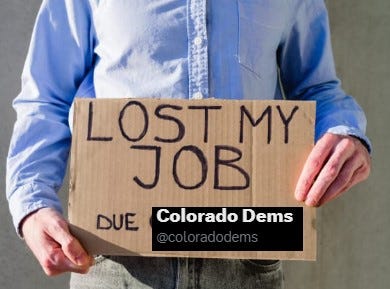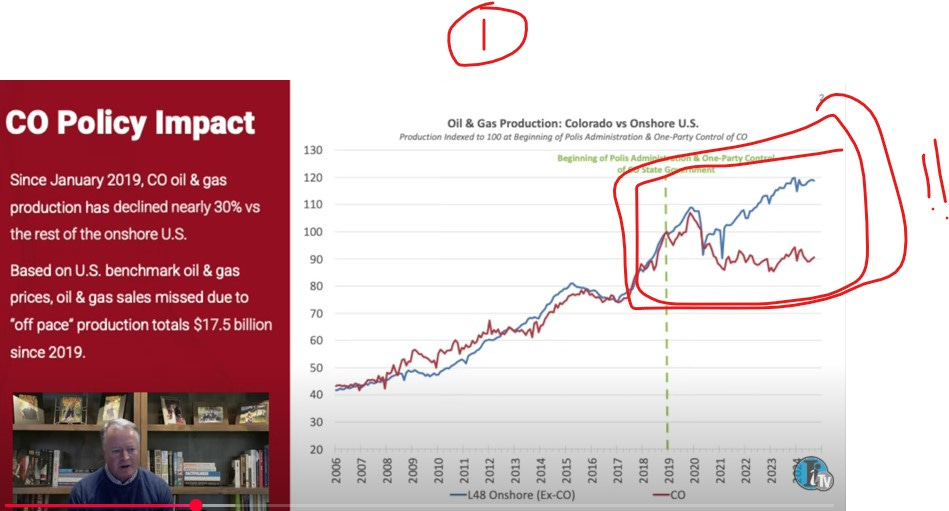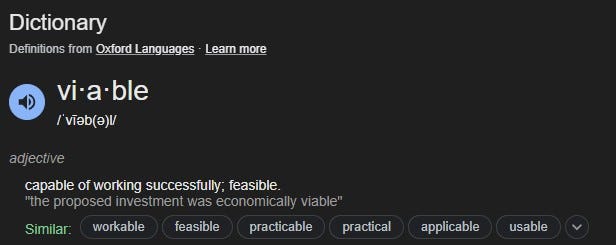Democrats' oil and gas policy raises costs. Imperial Democrats need a viable opposition party. Know your legislative committees.
The cost of the Democrats' environmental policy on oil and gas show up in ways other than lost jobs.
They show up in higher prices at the pump.
And they show up in higher taxes and fees from the state.
I greatly enjoyed the PowerGab episode linked below. Some of the themes in it you will recognize if you've read this page long enough.
But whether you're new to this or old, I'd still recommend a watch. There is a lot in there about the costs for exotic, carbon-free heating systems as well as ski trains. It's not feasible to cover it all.
As such, I want to spend this post fleshing out the third claim above, the one about higher taxes, since this one might be newer to you. It's not something I've written about in huge depth before.
The discussion I highlight starts at about the 7:00 mark in the video, and I attached the graph they use as screenshot 1.
What you are looking at in the graph is domestic oil and gas production for wells on land vs. year. The blue line is the national number (excluding Colorado) and the red line is Colorado. If you look closely, you will see that the graph has been indexed, meaning the vertical scale is not quite a percent but it's not actual barrels of oil: it is a relative number where 100 corresponds to the production levels at the time Jared Polis became governor and the Democrats took complete political control.
As you can see, right up until about COVID, Colorado followed national trends in terms of production. Post-COVID in this state, we tanked however. Oil and gas got back on its feet in the rest of the nation, but it did not (and has CONTINUED to not) when things returned to normal.
I want you to remember that when you hear politicians and others bloviating about after effects of COVID. We've had the after effects and it is no longer honest to claim that as a cause of lost economic activity for oil and gas here.
As Mr. Zorn has it, it's the regulation; operators simply are not willing to invest here if they have to deal with the outsized burdens our state puts on getting oil and gas out and off to market.
Plain and simple.
And while this has meant lost jobs and artificially reduced supplies (thus higher prices), it has also meant something else.
It is easy to forget just how many things in this state get their funding by taxing oil and gas extraction. They discuss a shortened list in the video, but it's a lot.
By taking the production shortfall (roughly the vertical distance between red and blue lines) for Colorado and multiplying the unextracted barrels of oil by first their market value and then their tax rate, you see that our state walked away from about $18 billion (yes, with a B) in potential tax revenue.
Stop and think about this. If you have less income coming into your budget, but the costs haven't dropped, you face a choice. Our state, faces the same choice. We can ...
Decrease funding for some things that used to be funded by oil and gas fees/taxes.
Shift the burden of that cost onto your shoulders.
Which of these two do you think are more likely to occur? My bet would be a mix, at least in the short term. Long term it's the latter because you and I both know that as soon as, say, funding for local fire depts drops, they'll be complaining and asking for more money.
Elections matter. Much of the above goes back to the state takeover by Democrats in 2019. Do not let them try to wiggle out of responsibility for it now (i.e. educate yourself by watching), and remember that your vote matters going forward!
Related.
I can't not include the following, also from the Power Gab episode. From the "no choice without a consequence dept", take a look at the screengrab from the video (linked again below for convenience).
It comes from the discussion beginning at about the 25:00 mark.
While our state and federal gov'ts are busy making our lives more expensive to please the environmentalists, we could have a bigger, better, and cheaper impact both here and worldwide if we would chip away at the causes for mortality around the world that can be fixed RIGHT NOW by reducing energy poverty.
And yes, this also includes bad environmental outcomes.
Imperial Democrats need a viable opposition party.
Good God yes they do!
I will leave it to you to read up on Mr. Armstrong's op ed, but I just want to say a couple things about it:
1. I wholeheartedly agree with his premise. For any sort of fairness and sanity in this state, we need a viable opposition party to the Democrats.
2. The condition of the Colorado Republican party being what it is, I ask myself: when, how, and who?
I've seen some encouraging signs in the 2024 election with the candidates that ran, and won, but there's a long way to go here.
Please, please, please Colorado Republicans: give me the best gift you could ever give a conservative living in Colorado in 2025: get the party back from its current leadership and get it back on track.
And quick!
https://pagetwo.completecolorado.com/2024/12/17/armstrong-imperial-colorado-democrats-viable-opposition/
Know your legislative committees.
There have been a couple recent articles about legislative committees which I wanted to share. They are linked first and second below.
There have been some shakeups to the committee assignments for the coming legislative term. Since bills must first get OUT of committee before they can be debated on the floor, this is more important than it might at first seem.
One vote in a committee can really make a difference.
I'll leave it to you to read the articles and draw any inferences or potential strategy from them. I'll be honest that I am not as politically plugged in on things like that, so I am not a good resource (thus, no comment).
What I do want to point you to, what I can speak more intelligently about, is the third link below. It's to the General Assembly's committees webpage.
If you read or hear about a particular bill being before this or that committee, this page is a good first stop. Find the committee and click on it. I'll use the Senate Agricultural and Natural Resources committee (much in the news lately because of wolves).
Screenshot 1 shows the upper portion of the committee webpage. I highlighted things I've used more than once in the past: the committee admin (contact info in the upper right) can be a very valuable resource for questions, and the committee members who, of course, do the voting. A click on the legislator's name will take you to that legislator's page (with their contact information, bills they're sponsoring, and any other committees they serve on).
Further down the committee page (not much to show, but shown in screenshot 2) you will find the schedule, activity, and upcoming hearings.
If you're new to this, take a second to poke around in a committee page so you can familiarize yourself with its links and functions. That way you can quickly find what you need when it comes time to speak up.
https://www.coloradopolitics.com/news/colorado-senate-lawmakers-get-committee-assignments-for-2025/article_2096b584-bf1d-11ef-a4ea-ef27a9e59628.html
https://tsscolorado.com/several-notable-changes-highlight-new-makeup-of-legislative-committees/
https://leg.colorado.gov/content/committees








